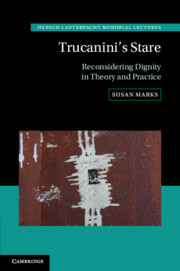Book contents
- Trucanini’s Stare
- Recent Books in the Hersch Lauterpacht Memorial Lecture Series
- Trucanini’s Stare
- Copyright page
- Dedication
- Contents
- Figures
- Preface
- 1 Introduction
- 2 The Idea of Human Dignity
- 3 Regarding Trucanini’s Dignity
- 4 Gandhi and the Undignified Loincloth
- 5 Dignity and Indignity in the South African Toilet Wars
- 6 Conclusion: Dignity and Its Outsiders
- Index
3 - Regarding Trucanini’s Dignity
Published online by Cambridge University Press: 06 February 2025
- Trucanini’s Stare
- Recent Books in the Hersch Lauterpacht Memorial Lecture Series
- Trucanini’s Stare
- Copyright page
- Dedication
- Contents
- Figures
- Preface
- 1 Introduction
- 2 The Idea of Human Dignity
- 3 Regarding Trucanini’s Dignity
- 4 Gandhi and the Undignified Loincloth
- 5 Dignity and Indignity in the South African Toilet Wars
- 6 Conclusion: Dignity and Its Outsiders
- Index
Summary
This is the first of three chapters which present ‘mini-studies’ of dignity. If, as the book argues, abstract discussion of dignity elides much of what we need to know about the concept, these mini-studies are designed to illustrate how a more contextualised treatment can take us further. Each of the mini-studies is concerned with dignity at a particular time, in a particular place, and with reference to a particular object. In the case of this chapter, the object is a series of photographs taken of Trucanini, a Tasmanian Aboriginal woman once (erroneously) said to be the ‘last of her race’. The chapter explores dignity at the intersection of colonial photography and Victorian race science.
- Type
- Chapter
- Information
- Trucanini's StareReconsidering Dignity in Theory and Practice, pp. 56 - 93Publisher: Cambridge University PressPrint publication year: 2025

